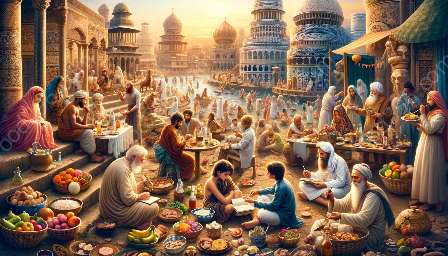Food holds a central place in every culture's history and development, and the rituals associated with its preparation, consumption, and avoidance are deeply rooted. This topic cluster explores the historical, cultural, and social significance of food rituals, taboos, and dietary restrictions, shedding light on their impact on food culture and history.
Historical Food Rituals
Throughout history, food rituals have played a vital role in shaping cultural identities and social interactions. These rituals often revolve around communal meals, religious ceremonies, and special occasions, reflecting the values and traditions of different societies.
One example of a historical food ritual is the Japanese tea ceremony, known as chanoyu. This centuries-old practice emphasizes harmony, respect, purity, and tranquility, with meticulous attention to every detail of the tea preparation and serving process. The ceremony embodies Japan's cultural and aesthetic principles, making it a significant aspect of Japanese history and food culture.
Another prominent food ritual is the French tradition of formal dining, marked by a multi-course meal with specific etiquettes and customs. This elaborate dining experience reflects the sophistication and refinement of French culinary heritage, showcasing the importance of food rituals in expressing cultural values and social norms.
Historical Food Taboos and Dietary Restrictions
Food taboos and dietary restrictions have been prevalent across diverse societies, often rooted in religious beliefs, health considerations, and cultural practices. These prohibitions and limitations on certain foods or eating habits have significantly impacted culinary traditions and historical development.
The Hindu cultural practice of vegetarianism serves as an example of historical dietary restrictions. With roots in ancient religious texts, the concept of ahimsa, or non-violence, has led to the widespread adoption of vegetarian diets in Hindu communities, shaping the historical evolution of Indian cuisine and food culture.
Additionally, the Jewish dietary laws, known as kashrut, outline specific food prohibitions and regulations, such as the avoidance of certain combination of foods and the requirement for ritual slaughter and food preparation. These dietary restrictions have not only preserved the culinary heritage of the Jewish people but also influenced the broader historical context of food consumption and cultural identity.
Food Culture and History
Food culture is intertwined with the historical narratives of civilizations, reflecting the social, economic, and environmental contexts in which different culinary traditions emerged and evolved. Understanding the historical significance of food rituals, taboos, and dietary restrictions is essential for comprehending the complex tapestry of food culture and history.
For instance, the ancient Mayan civilization's practice of offering food to their deities as part of religious rituals not only underscores the spiritual significance of food but also provides valuable insights into the historical significance of food in shaping cultural beliefs and practices.
Furthermore, the Chinese tradition of feng shui incorporates food-related customs and beliefs that are deeply entrenched in historical cultural norms and superstitions. The placement of dining tables, selection of auspicious foods, and adherence to specific mealtime practices all contribute to the historical development of Chinese food culture and its interconnectedness with broader historical narratives.
In conclusion, historical food rituals, taboos, and dietary restrictions are integral components of food culture and history, embodying the rich tapestry of human experiences and traditions. Exploring these aspects offers valuable insights into the diverse and complex relationships between food, culture, and historical development across different societies and civilizations.

